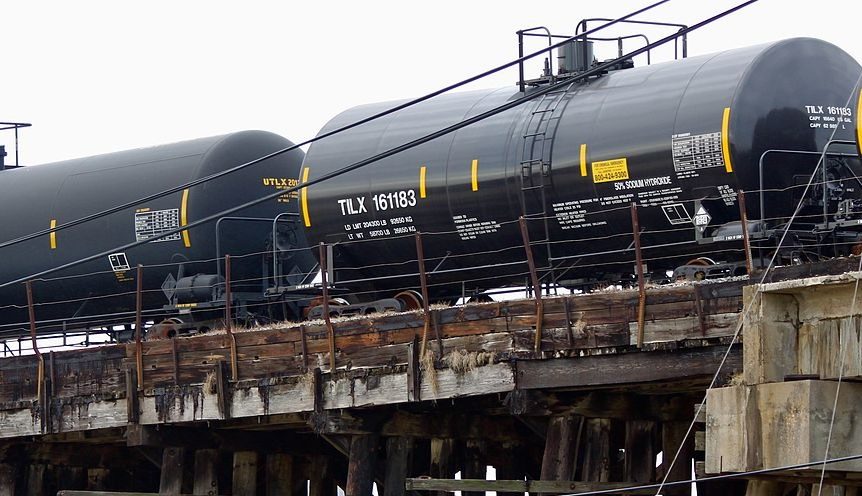AUGUSTA — The state committee charged with promoting transparency in government is asking lawmakers to overhaul a 2015 law that made secret information about the transportation of crude oil and other hazardous materials by railroad through Maine.
The legislature’s Right-to-Know Advisory Committee voted Wednesday to send a letter to the Judiciary Committee recommending that it reconsider the controversial law in order to ensure that the government is not keeping railroad data secret unnecessarily.
The legislation in question, enacted in October 2015, initially prevented officials from divulging information that it had previously provided to the public about rail shipments of hazardous materials passing through the state. The law took effect more than two years after a runaway oil train killed 47 people and leveled the town of Lac-Megantic, Quebec, just across the border from Maine.
Lawmakers and railroad lobbyists said secrecy was needed to protect confidential business information and prevent terrorist attacks, but transparency advocates argued the public has the right to know what the trains are carrying.
Committee members sided Wednesday with transparency advocates, asking lawmakers in the letter to carefully weigh the public’s interest in having access to the information against potential safety concerns or business interests.
“We recommend the Judiciary Committee consider submitting a committee bill…in a manner that allows the most meaningful participation by stakeholders, state and local government entities and other members of the public,” states the letter, which will be submitted to lawmakers before the upcoming legislative session begins in December.
ERODING FOAA
The controversy over the oil train data underscores the gradual erosion of Maine’s 40-year old Freedom of Access Act, which was originally intended to ensure citizens have access to government information but has become increasingly riddled with loopholes.
As of 2015, state legislators had approved at least 450 exceptions to the law, each of which allows the government to keep certain information secret from the public. Last year’s railroad law added nearly 200 pages of chemicals shipped by rail to the growing list of secrets kept by the government, according to a memo filed with the committee by the Department of Environmental Protection in July.
Environmental officials questioned whether the exception was necessary.
“The additional burden of reviewing this list….provides no increase in safety for the citizens of Maine,” DEP officials wrote to the Right-to-Know advisory committee.
Right-to-Know Committee member Judy Meyer, the executive editor of the Lewiston Sun Journal, noted in July that it was ironic that the law made secret the contents of railroad cars that any citizen could observe passing through a railroad crossing.
“To make private these records that are rolling through our city streets is odd to me,” Meyer said.
The committee’s recommendation to clarify the law follows a February 2016 investigation by the Maine Center for Public Interest Reporting that showed lawmakers who approved the bill repeatedly bypassed safeguards designed to prioritize the public’s right-to-know over private business interests.
Following a Freedom of Access Act request by the Center, environmental officials consulted with the Attorney General and once again began providing railroad data to the public, but in July admitted there was still confusion over the law’s intent.
“The Department…seeks to clarify the exact information that is exempted by the law,” according to the DEP memo submitted to the committee.
RAILROAD HAZMAT
Interest in railroad cargoes through Maine piqued in early 2013, when the state became top exporter of crude oil by rail. Maine, the country’s easternmost border state, was a key transit point between the oil fields of western North America and the 300,000-barrel-per-day Irving oil refinery in neighboring Saint John, New Brunswick, one of New England’s largest suppliers of gasoline.
After the Lac-Megantic accident, environmentalists began protesting the cargoes, blocking railroad tracks and calling for a ban on its transport.
Around the same time, documents uncovered by the Maine Center For Public Interest Reporting investigation showed the railroad industry began lobbying to keep data on its cargoes secret from the Maine public.
Former Rep. Mike Shaw, D-Standish, the legislator who sponsored the bill and a railroad conductor by trade, had initially argued the legislation was needed to ensure railroads provided emergency officials with details about hazardous material shipments through Maine.
But the 80-word bill that emerged last year did nothing to make railroads provide information to local first responders. Instead, it only forced the state to keep those details secret from the public when railroads volunteered the data.
The legislation, which created the 460th exception to Maine’s Freedom of Access Act, also contradicted the findings of federal regulators. A year earlier, they had determined that information about oil train shipments was “neither security-sensitive nor commercially-sensitive,” according to a notice published in the Federal Register.
The bill nonetheless became law in June 2015 over a sharply worded veto from Gov. Paul LePage.
When presented with these findings in an interview in January, former Rep. Shaw, who resigned from the legislature in August for personal reasons, said he was willing to encourage lawmakers to amend the bill to allow officials to disclose volumes of crude oil moving through Maine.
“Keeping them confidential was really never my intention,” said Shaw.







